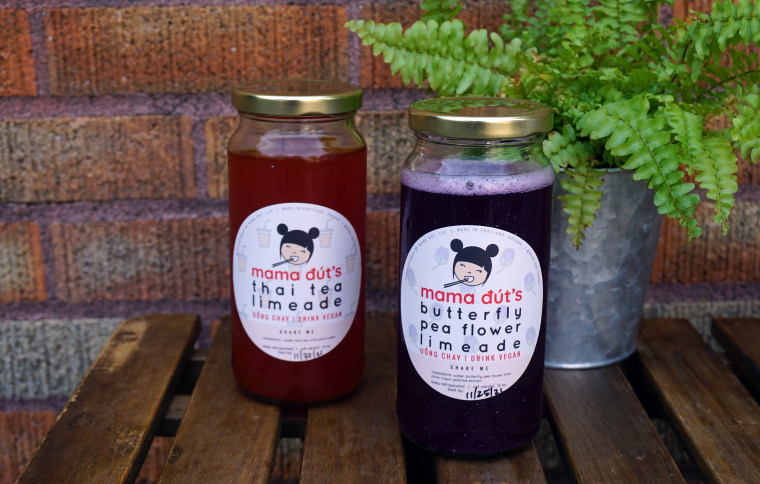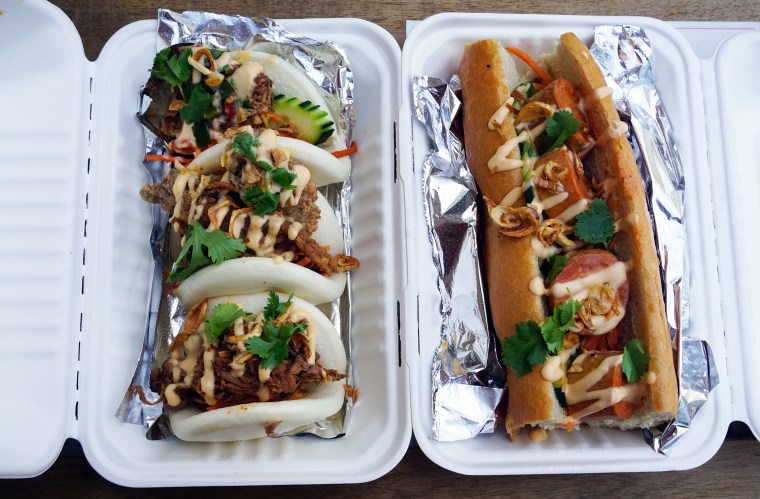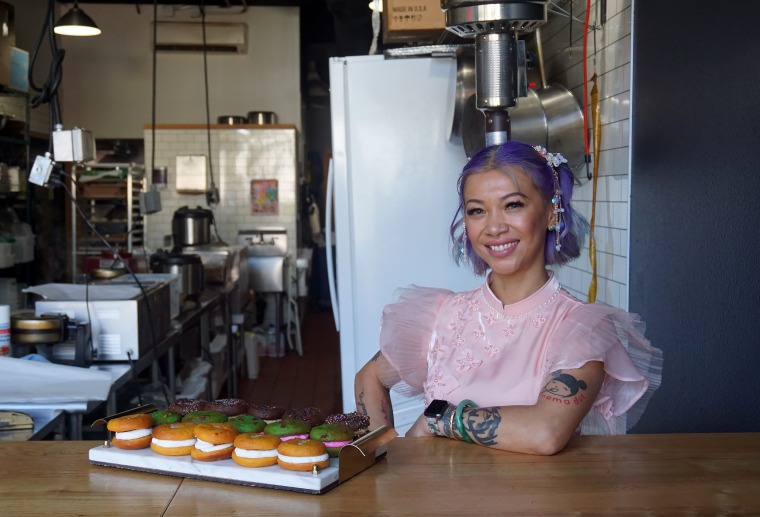Thuy Pham fled Vietnam as a baby and grew up in the United States with a love-hate relationship with her culture’s traditional foods. She never went to culinary school, but after going vegan in 2019, she became a self-taught hobby cook motivated by the need to veganize her favorite Vietnamese dishes.
In March 2020, the pandemic brought Thuy Pham’s decade-long career as a hairstylist to a halt. Out of business and with unexpected free time, she decided to perfect her recipe for vegan pork belly. Pham did an Instagram Live preparing the dish at her young daughter Kinsley’s request. Less than a month later, she launched her food business, Mama Đút, named after the Vietnamese-English phrase she and her daughter use, meaning “mama, feed.” Luckily, Pham had registered the name with the state for her child who is passionate about cooking videos.
Mama Đút is the first vegan business on Netflix’s “Street Food” series, an accomplishment Pham is very proud of as she feels vegans don't often have a seat at the table. This year, she was nominated as an Emerging Chef by the James Beard Foundation, which she says she didn't realize were “the Oscars for food.”
Pham is celebrated for good reason — she’s been in the food industry for just over two years and is slated to open her second restaurant early next year. The new location will feature indoor seating, new menu items and more bakery offerings. TODAY.com chatted with Pham about how she’s found so much success — so quickly — as a vegan entrepreneur.

Your family left Vietnam when you were one. What was that experience like?
In 1981, my family escaped from Vietnam in the middle of the night in my grandmother’s fishing boat and we were captured by pirates. Growing up, I didn’t have pictures of myself as an infant because our belongings were tossed into the sea. We were eventually rescued and taken into a refugee camp in Indonesia while we were waiting for sponsorship to the United States. In 1982, we arrived in Portland, Oregon.
How did your immigrant experience prepare you for COVID-19?
The situations and scenarios that immigrants go through build grit which gets passed down over generations. As a refugee immigrant, survival and fighting is in my blood. The first years of my life were fighting for survival — in that fishing boat in the middle of the ocean, then in a foreign land. Fight to make it out of a war-torn country, fight to make it to the U.S., fight to learn the language, fight to get out of poverty. When your body and your soul are conditioned to respond as a fighter and as a survivor, by the time you’re in your 40s that survival is always on. I’m still in survival mode.
What are your earliest memories of food?
There’s a photograph of me at one-and-a-half at a refugee camp. I’m sitting down, dressed very simply and barefoot. I had a bag of cookies in my hand. I’d be happy to get snacks. Even as a child, I was very food-driven. Food as a sign of love was embedded in me very early on. In the refugee camp, my family had nothing except the clothes on our backs and morsels of food.
What dishes make you think of your childhood?
The aroma of steamed rice cooking is so comforting for me. It’s like a warm hug from my ancestors. Anytime I smell steamed rice, I always think of my childhood.
What was it like eating traditional Vietnamese foods as a young immigrant?
We lived in Sacramento when I was in third grade and I wanted to change my Vietnamese name. It was uncomfortable explaining how to pronounce my name. I dreaded bringing friends over to the house because I didn’t want them to smell that my mom was cooking Vietnamese food. It’s traumatic to always worry about checking your clothes to make sure it doesn’t smell like fish sauce.
Why did you go vegan in 2019?
I grew up Catholic and we celebrated some Buddhist traditions, but we didn’t go to temples and weren’t exposed to how abundant veganism was in Vietnamese cuisine. I thought that if I went vegan I wouldn’t be able to eat Vietnamese food. I faced the environmental impacts and animal cruelty and decided to go vegan one meal at a time.
How did going plant-based result in you becoming a self-taught chef?
The two cookbooks I found in the States weren’t written by Vietnamese people, they were written by white men. My cousin in Saigon sent me vegan Vietnamese cookbooks and my mom and I would test recipes. It gave me a better understanding of my culture. I wouldn’t have learned so many new Vietnamese recipes that are rooted in Buddhism if I hadn’t gone vegan.
Becoming vegan helped me reconnect with my identity as a Vietnamese person, which is ironic because I thought it would disconnect me from my Vietnamese identity.
Why did you start with vegan pork belly?
Roasted pork belly is a staple in Vietnamese food. I had to try to replicate it if I was going to be included in family celebrations. I rediscovered my passion for cooking by watching videos of Vietnamese monks making vegan pork belly.
In April 2020, Kinsley, who was seven, asked if we could live stream making vegan pork belly on Instagram. I had 3,000 followers and didn’t imagine an Instagram Live would turn into a lucrative business. I had a few slabs left and my DMs just went wild with orders. Had Kinsley not suggested the Live, I don’t know if Mama Đút would exist.
What is the story behind the name Mama Đút?
Kinsley opened up my heart to be a more compassionate human being. I had to honor my baby. So much of Mama Đút is a reflection of my love for Kinsley. When I feed Kinsley, I say "mama đút" because đút means to feed.
Đút is phonetically "dot," but I spelled it the Vietnamese way so people would learn how to pronounce it. The logo, which my sister Cathy Pham illustrated, is me feeding Kinsley. Within 24 hours, we had a logo and a name.
How did COVID catalyze the launching of a vegan Vietnamese food business?
At the beginning of the pandemic, salon services were shut down. I needed to make money to survive. I saw a window of opportunity and jumped on it and launched Mama Đút with $500 and started taking orders, hoping to make enough to get groceries on the table. I got so many inquiries in the first 24 hours. About two weeks later, I was moving into my first commissary kitchen.

It was your 40th birthday when you moved into the kitchen. What did that symbolize for you?
It was momentous and the best way to celebrate my 40s — investing in myself. It took 40 years to have that moment where it felt OK to celebrate me, believe in me and invest in me. I truly never did that before.
How did selling vegan pork belly on Instagram lead to a restaurant?
The intent was to just sell vegan pork belly, but to do so I had to have pictures of the dishes. My kitchen mates thought the dishes were great and encouraged me to do my first pop-up in June 2020. I announced it on Instagram with the menu and the number of portions for pre-orders to keep a tight inventory and avoid food waste.
Five hundred portions sold out in six hours. I broke down and cried. I felt so much love and so seen for my food and my culture as a Vietnamese American and as an immigrant. I did a few more pop-ups with more portions that also sold out.
What happened next?
By the fall of 2020, a friend let me use his empty kitchen space and takeout counter to help alleviate some overhead while I built my business. He empowered me to believe in myself. The grand opening was on Nov. 7. About 30 minutes before we were supposed to open, there was a huge line. I remember popping my head out and feeling panicked.
How has the success of Mama Đút impacted you?
I never thought I’d have the means to open a restaurant — it felt too big of a dream. Growing up, I wasn’t told to dream big. My dreams always had a glass ceiling. When you’re a child of immigrants growing up in poverty or marginalized communities, your dreams are pretty simple — to have food on the table and pay rent.

